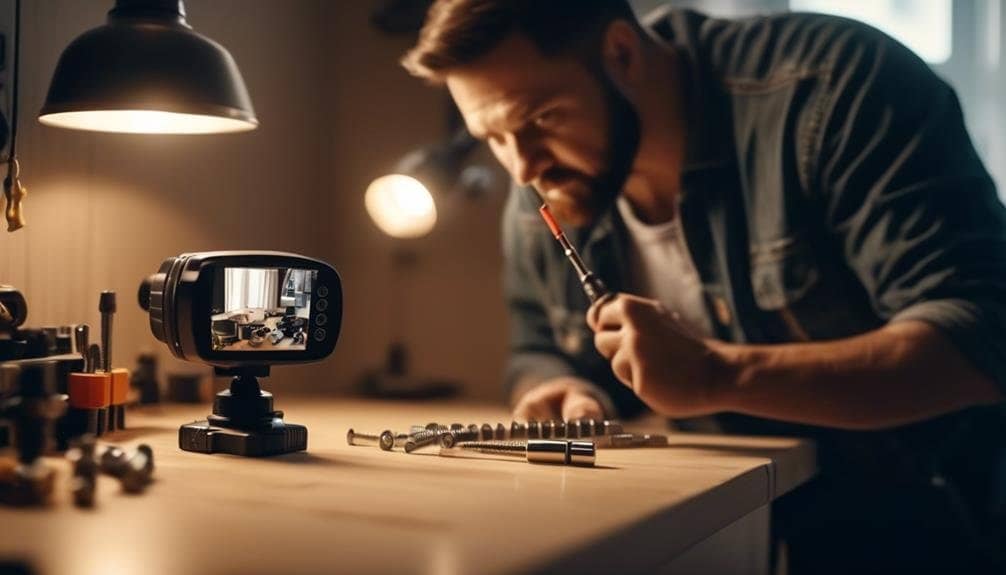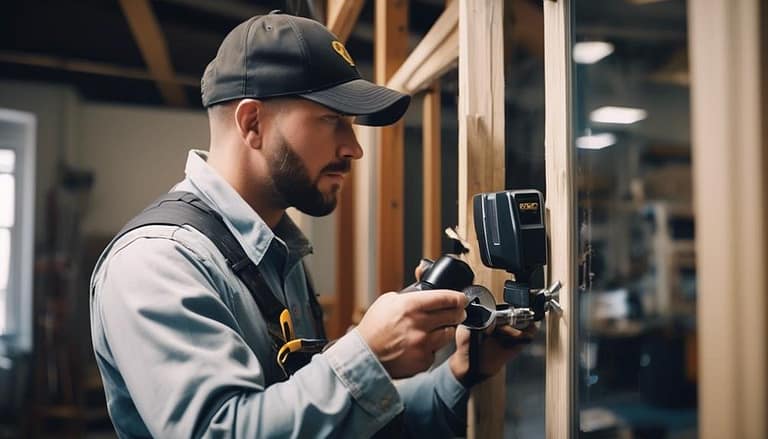8 Essential Tips for Home Security System Repairs
You've got a top-of-the-line home security system to keep your family and property safe. However, as time goes on, some parts may need maintenance or repairs to make sure everything keeps working as it should.
From adjusting where the sensors are to checking the control panel, there are some important tips to help you keep your home security system in great shape. By following these tips, you can make sure your home is as secure as possible and have peace of mind knowing your system is working well.
But what are these tips, and how can they help your home security system?
Key Takeaways
You have a high-quality home security system to ensure the safety of your family and property. However, over time, certain parts may require maintenance or repairs to ensure that everything continues to function properly.
From repositioning sensors to checking the control panel, there are some important tips to help you maintain your home security system. By following these tips, you can ensure that your home is as secure as possible and have peace of mind knowing that your system is in good working order.
But what are these tips, and how can they help you maintain your home security system?
Understanding Home Security System Components
Understanding how home security systems work starts with recognizing that they consist of interconnected devices and sensors that work together to protect your property. These sensors are vital for detecting any changes in the environment and triggering the appropriate response, such as activating an alarm. They can include motion detectors, window and door sensors, and glass break sensors. It's important to regularly check and maintain these sensors to ensure they're working properly. Look for any signs of damage, like rust or loose wiring, and fix any issues promptly.
The control panel acts as the central hub, coordinating all the connected devices and serving as the brain of the security system. It's crucial to keep the control panel in good working condition.
Lastly, cameras provide visual surveillance, deterring potential threats and capturing footage of the surroundings. Regularly inspect and clean the cameras to maintain their effectiveness.
Understanding these components and performing routine maintenance will help keep your home security system in great shape.
Performing Routine Maintenance Tasks
Regularly checking and cleaning sensors is crucial to keep your home security system working at its best. By doing routine maintenance, you can make sure that your security system is always ready to protect your home.
Here are some important maintenance tasks for your security system:
- Test alarms and sirens regularly to make sure they work and can alert you when necessary.
- Check and clean camera lenses to get clear footage and keep an eye on your property.
- Make sure the control panel and keypad are working properly for easy access to your security system.
- Check and replace batteries in all system devices as needed to prevent power failures that could put your security at risk.
Troubleshooting Common Issues

When troubleshooting common issues with your home security system, it's important to understand the potential causes of false alarms and sensor malfunctions. Frequent false alarms can indicate a problem with the system that needs to be addressed. Start by checking the positioning of sensors and making sure they're clean and unobstructed. Regular maintenance and cleaning can help prevent common security system issues, so be sure to include this in your routine maintenance tasks. Additionally, keeping an eye on the system for any irregularities or patterns in false alarms can provide valuable insight into potential issues.
When troubleshooting your security system, it's important to inspect and clean wiring, run diagnostic tests, and ensure proper sensor placement. Understanding the components needed for security system repair, such as replacement sensors and basic tools, is essential for effective troubleshooting. By familiarizing yourself with the system and its components, you can proactively address and resolve common issues, ensuring that your home security system operates at its best.
Maintaining Control Panels and Keypads
Regularly checking and cleaning the control panels and keypads of your home security system is essential to ensure it works properly. Here are some important tips for maintaining control panels and keypads:
- Test the control panels and keypads to make sure they respond correctly to your inputs.
- Check the wiring connections and power supply for any damage or loose connections.
- Replace worn-out or malfunctioning keypads to keep your security system working effectively.
- Keep the control panels and keypads free from dust and debris to prevent malfunctions and ensure smooth operation.
Battery Maintenance and Replacement

It's important to regularly change the batteries in your home security system's sensors, keypads, and smoke detectors to make sure they work well.
Using long-lasting lithium batteries can give you longer protection and reduce how often you need to change them.
Checking the batteries often is crucial to avoid false alarms and keep your home secure.
Battery Lifespan
Taking care of the batteries in your home security system is really important to make sure you always have the protection you need. Here are some tips to help your batteries last longer and keep your system working well:
- Remember to change the batteries in your sensors, keypads, and smoke detectors regularly so they don't stop working unexpectedly.
- If the batteries get too low, your alarm system mightn't work as well, so it's a good idea to replace them before that happens.
- Consider using long-lasting lithium batteries for extra peace of mind and protection.
- Checking your batteries regularly can help stop false alarms and make sure your system works properly when you need it.
- Looking after your batteries properly means you'll always have security coverage and reduce the chances of your system not working.
It's really important to stay on top of replacing and maintaining your batteries for your home security system to keep it working well for a long time.
Proper Installation
Making sure your home security system is properly installed is essential for keeping your home safe. A big part of that's taking good care of the batteries. You need to check and replace them regularly to make sure your security system works as it should. This is really important for keeping your home and loved ones protected.
Here's what you need to do:
- Sensors: Change the lithium batteries every 2-3 years.
- Keypads: Swap out the alkaline batteries once a year.
- Smoke Detectors: Replace the lithium batteries every 5-7 years.
Using long-lasting lithium batteries will give you peace of mind and prevent false alarms. It's a good idea to check the batteries regularly to catch any issues early on. By staying on top of battery maintenance, you can trust that your home security system will always be there for you when you need it.
Conducting Weekly Perimeter Checks
Hey there homeowners!
Don't forget to check your door and window sensors as part of your weekly home security system perimeter checks. Start by testing the reed switch to make sure it works when doors are opened and closed.
Check the adhesive of the sensors to prevent them from falling off, and stick them back on if needed.
Take a moment to look at your cameras every day, making sure they've power, are positioned correctly, and have clean lenses.
Also, check your monitoring and recording devices to make sure they capture clear images.
Testing Control Panel Functionality

When you're doing your weekly checks for your home security system, make sure you test out the control panel too. Testing the control panel regularly is super important to make sure your whole system works well. Try out all the features and modes on the control panel to make sure everything is working properly.
You can use the test mode to do self-checks on the control panel and make sure all the sensors are working like they should. This proactive approach helps keep your security system in good shape. Before you test the control panel, especially if you have a monitoring service, remember to tell your security provider so you don't accidentally set off any alarms.
Also, take a look at the control panel for any loose wires, damage, or signs that something's not right. If you find anything, get in touch with your security provider to get it fixed. By doing these things regularly, you can keep your control panel in good working order and have peace of mind knowing your home is safe.
Educating Family on System Usage
Explaining the home security system to everyone in your household is crucial. It ensures that all family members understand how to use it effectively. Here are some tips for educating your family on system usage:
- Clearly explain how to arm, disarm, and handle emergencies so that everyone feels confident in any situation.
- Teach everyone how to use the control panel, keypads, and any remote access features for easy interaction with the system.
Stress the importance of regular testing and maintenance, and encourage everyone to take an active role in caring for the home security system.
- Emphasize the role of the security system in keeping the household safe to foster a sense of shared responsibility for home security.
- Engage your family in discussions about home security system maintenance to reinforce the idea that everyone plays a part in maintaining a safe and secure home environment.
Empowering your family with the knowledge and skills to use the home security system effectively and responsibly will contribute to a sense of security and freedom within your household.
Frequently Asked Questions
What Are the General Home Security Tips?
As a homeowner, it's important to regularly check the perimeter of your property, clean sensors and cameras, conduct system tests, install updates, and schedule yearly evaluations with professionals. These general tips help ensure that your home security system is in top condition, providing peace of mind for you and your family.
How Do You Maintain a Security System?
Keeping your security system in top shape is essential for protecting your home and loved ones. Start by regularly cleaning and inspecting all parts of the system to make sure everything is working as it should. Don't forget to test and replace batteries to ensure that your system is always powered up and ready to go.
It's also important to check the wiring to make sure it's all in good shape. And don't forget to stick to a maintenance schedule to stay on top of any potential issues. It's a good idea to have a qualified technician come in for annual inspections to give your system a thorough check-up and make any necessary updates. By staying on top of maintenance, you can have peace of mind knowing that your security system is always ready to keep your home safe.
How Often Should a Security System Be Serviced?
Make sure to have your security system checked every year to keep it working properly. It's important to have regular maintenance done on sensors, alarms, cameras, control panels, and keypads. Also, don't forget to replace the batteries when needed to avoid any system failures.
What Is a Weakness of Home Security Systems?
Home security systems can have a weakness when it comes to signal interference, which can make them vulnerable. It's important for homeowners to keep their systems well-maintained and clean to address this issue. Consider using hardwired systems as they can provide increased reliability in preventing these potential weaknesses.







